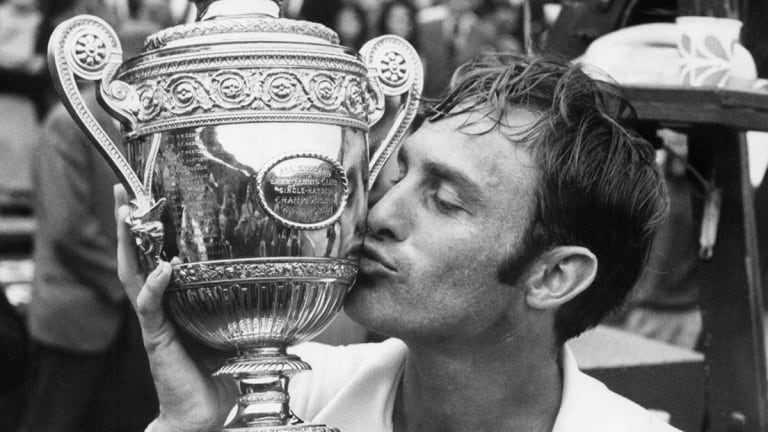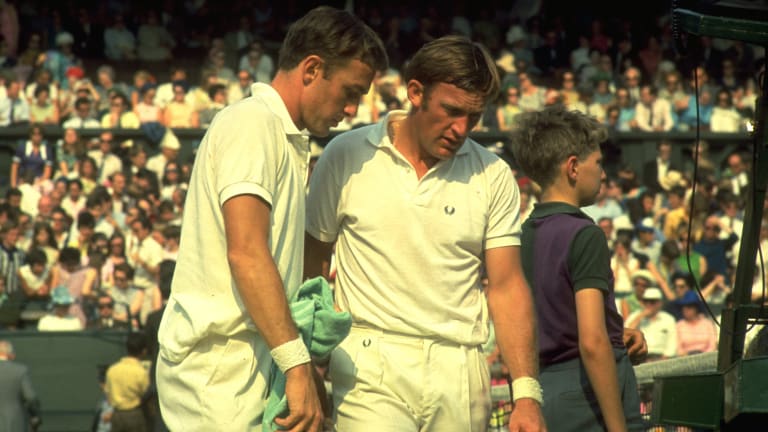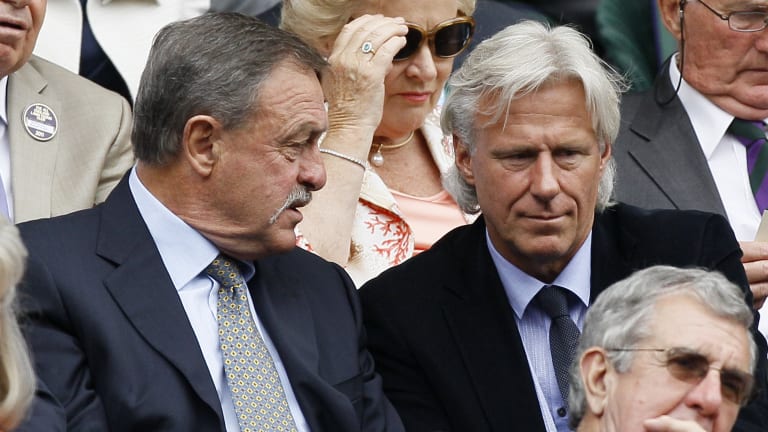Wimbledon
The career centerpiece: John Newcombe's halcyon Wimbledon days
By Steve Flink Jul 03, 2020Wimbledon
Wimbledon to replace line judges with electronic line calling from 2025
By TENNIS.com Oct 09, 2024Wimbledon
The amazing journey of Henry Patten from IBM data logger to Wimbledon doubles champion
By TENNIS.com Jul 16, 2024Wimbledon
Hsieh Su-Wei, Jan Zielinski win mixed doubles title at Wimbledon
By Associated Press Jul 15, 2024Wimbledon
Why Wimbledon Endures
By Peter Bodo Jul 15, 2024Wimbledon
Novak Djokovic seeks 2024 answers for Alcaraz and Sinner after great effort: 4 ATP Wimbledon takeaways
By Joel Drucker Jul 14, 2024Wimbledon
Carlos Alcaraz is a champion establishing how high he will climb with latest Wimbledon title
By Steve Tignor Jul 14, 2024Wimbledon
Nicolai Budkov Kjaer makes history in winning junior boys' Wimbledon title; Renata Jamrichova wins girls' title
By Associated Press Jul 14, 2024Wimbledon
Carlos Alcaraz beats Novak Djokovic again in Wimbledon final for fourth Grand Slam title
By TENNIS.com Jul 14, 2024Wimbledon
For Jasmine Paolini, Barbora Krejcikova was one forehand and one serve too good in the Wimbledon final
By Steve Tignor Jul 13, 2024Wimbledon
The career centerpiece: John Newcombe's halcyon Wimbledon days
Greatness was not fully bestowed upon the Aussie until 1967, the year he first ruled at Wimbledon, and the moment his life was altered irrevocably.
Published Jul 03, 2020
Advertising
As a kid growing up in Australia, John Newcombe had a reverence for Wimbledon that knew no bounds. He made his mark when he was very young, representing his nation in the Davis Cup Challenge Round of 1963 against the United States at 19, reaching his first major semifinal at the Australian Championships in 1965, and making it to the final of the 1966 US Championships.
But greatness was not fully bestowed upon Newcombe until 1967, the year he first ruled at Wimbledon, and the moment his life was altered irrevocably.
“It was my seventh year at Wimbledon. I had never reached the quarterfinals before 1967,” he told me in a recent interview. “But I found the formula that year of how to survive through two weeks. I started preparing for Wimbledon three months before the tournament. Every day, I did an extra fifteen minutes of exercises, but my preparation was as much mental as anything else.”
In the final, No. 3 seed Newcombe was heavily favored to defeat unseeded Wilhelm Bungert. But he was taking nothing for granted.
He says, “I had never lost to Bungert before. However, the first Wimbledon final you play is unknown territory. You are not sure how you are going to react.”
There was no way for Newcombe to prepare for this propitious occasion.
“Everybody told me,” he says, “that a Wimbledon final is different. You walk out on the Centre Court and when you get to the service line, you turn around and bow to the Royal Box. You reach your chair and there are a mass of photographers. I warmed up and thought, ‘This is not too bad.’ Then the umpire said, ‘Player’s ready, play.’ I bounced the ball to serve and looked down at my racquet in front of me. It was shaking.”
Understandably apprehensive, Newcombe lost his opening service game but thereafter, he thoroughly outclassed Bungert, swiftly rolling to a 6-3, 6-1, 6-1 victory.
“It was a dream come true. For a while it is almost like a fantasy,” Newcombe reflects. “After a Wimbledon final the victory doesn’t sink in for about two days. Then you have a quiet moment and reflect on what happened, and it really sinks in.”
By virtue of that triumph, Newcombe established himself as the last men’s Wimbledon champion in the amateur years. A year later, when the All England Club transitioned to the Open Era, he was beaten by Arthur Ashe in the round of 16. But in 1969 he made it back to the final, losing an absorbing battle against Rod Laver, who took a third major in a row on his way to a second calendar Grand Slam.

The career centerpiece: John Newcombe's halcyon Wimbledon days
Advertising
The Aussie earned his second Wimbledon trophy in 1970. (Getty Images)
Newcombe gave a first-rate performance in defeat before bowing in four sets.
“At the end of the first set I thought, ‘I have got to change the game up here and do something different to upset his rhythm’” he remembers. “So I started lobbing him, dinking him and making something different happen every point. It worked. I won the second set and got a break up in the third. Then Rod played a fantastic shot to make it 15-40 on my serve. He broke me back. He took the match. I was pretty happy with my performance. Rod says that might have been his toughest Wimbledon final.”
Newcombe and Laver celebrated the 50th Anniversary of their memorable Wimbledon duel by sitting together in the Royal Box for the epic Novak Djokovic-Roger Federer duel, won by the Serbian in a decisive final set tiebreaker.
“That took us back to the emotions we shared being in a Wimbledon final fifty years earlier,” he says. “It was an honor to sit next to Rod for that match knowing we had played on that same court for the title in 1969.”
The Newcombe of 1970 was more seasoned, an improved match player and a man primed to win. He took his second title at SW19 in style.
The critical match for Newcombe that year was against countryman Roy Emerson, the 1964-65 Wimbledon champion. The two magnificent serve-and-volley practitioners clashed in the quarterfinals.
“When I first became a Davis Cup squad member, Emmo and Rod were No. 1 and No. 2 in the world,” Newcombe says. “The first time I played him I was 18 years of age and I led him two sets to one before losing 6-4 in the fifth. From then on every time Emmo played me he treated it like a Wimbledon final. There was a lot of baggage there for me going into our 1971 match after a number of losses to him.”
Nevertheless, Newcombe was resolute. He recalls, “I won the first set easily before he won the next two. I won the fourth. Then we got into this titanic battle in the fifth. He had seven break points and I saved them all. I never had one. Finally, at 10-9 for me, I got to 30-40 on his serve, ran around my backhand on his second serve and hit a forehand return winner down the line. That was it. It was a milestone in my career.”

The career centerpiece: John Newcombe's halcyon Wimbledon days
Advertising
Newcombe and compatriot Tony Roche at the Championships. (Getty Images)
Buoyed by succeeding in such a protracted encounter, Newcombe handled the Spaniard Andres Gimeno in the semifinals and then took on countryman Ken Rosewall in the final.
Newcombe was ahead two sets to one and 3-1 in the fourth.
“I was not giving him a lot of breathing room,” he says. “I felt like I had him beaten. I had always been a crowd favorite and so had Ken, but he had never won the tournament. So he was the sympathetic favorite. When I got him down they were trying to will him to come back. If I would miss a shot they would applaud. When Ken hit a winner they applauded really loud. It got to me. I thought, ‘Wait a minute. I want to win this, too.’ I got upset. That Centre Court is a cauldron. If you allow the emotions of the crowd to get inside your head, it can really affect you.”
Rosewall proceeded to win five games in a row to take the fourth set. Newcombe was dazed in that stretch, barely winning points, wounded emotionally. As he changed ends of the court, he heard an inner voice telling him he had some urgent business to conduct.
“They didn’t have chairs in those days when we changed ends, “he says. “I am at the net pouring a drink. I said to myself, ‘How badly do you want to win this?’ I answered, ‘I really want to win it.’ So I said to myself, ‘Okay, you are going out on the court and there is not going to be anything else out there except someone at the other end of the tennis court. Umpire, crowd, nothing else exists.’”
That changed everything for Newcombe.
“In that 60 seconds standing at the net before we started the fifth set,” he says. “I went from one hundred percent negative to one hundred percent positive in my mind. When I went back on the court, I knew what Ken was going to do before he did. I had no doubts about what I could do. I remember one 15-30 point when I hit a second serve ace down the middle. I didn’t even think about if I should do it. I just knew that serve was going in. So I put myself into a Zen Zone where I had total control over everything that was happening to me.”
Newcombe played perhaps the best big set of his career, and came away with a hard earned 5-7, 6-3, 6-3, 3-6, 6-1 win over Rosewall for the title.
He says, “Two days later I am sitting there thinking, ‘Wow, I won Wimbledon for the second time and beat Ken Rosewall.’ Then I thought, ‘You know what—I am more proud of what I was able to do to myself in 60 seconds at the change of ends before that fifth set. It was a great life lesson for me. I had always been a strong thinker and liked to control my negative emotions, but this was something extra.”
A year later, he came back to defend that crown with many players and insiders believing he would succeed. Newcombe confronted Stan Smith in the final and they put on a stirring five-set show.

The career centerpiece: John Newcombe's halcyon Wimbledon days
© ASSOCIATED PRESS
Advertising
Newcombe and Bjorn Borg at 2011 Wimbledon. (Getty Images)
Early on, Newcombe had the upper hand before losing steam.
“I was on top of him in winning the first set,” he explains. “But a few games before the end of the second set, I dived for a volley and landed on my solar plexus. That really knocked the wind out of me. He broke me, won the set and was up 4-2 in the third. I thought, ‘This is ridiculous. I am really drained.’ I knew I could play five, six or seven sets. So I went back in my mind to that moment when I got the wind knocked out of me. I thought, ‘Okay I am going to lose this third set but I have got ten or fifteen minutes to readjust my whole body.’ I started taking deep breaths and going inside myself to get a second or third wind.”
Newcombe recovered his strength and conviction over the last two sets, a 6-3, 5-7, 2-6, 6-4, 6-4 win over Smith for a third singles crown. How does he compare his victory over Smith in 1971 to his triumph over Rosewall the year before?
“I rate my win over Ken higher since he was one of my boyhood heroes,” he says. “It was a magic moment for me to play back to back Wimbledon finals against Laver and Rosewall. But the win over Stan gave me a fair amount of self-belief.”
Newcombe did not play Wimbledon in either 1972 or 1973. The WCT ban in the former year kept him out, and then he gallantly joined the 1973 ATP player boycott.
“’72 was the bigger disappointment,’ he says. “All the WCT players realized they were not allowed to play, but being the two-time defending champion I put my entry form in and turned up at Wimbledon. They still would not allow me to play. That was devastating. Nobody had won Wimbledon three years in a row since Fred Perry from 1934-36, so I would have had a chance to make some history.”
After the 1973 ATP boycott, he returned to his tennis ranch in Texas and thought seriously about retiring. He had three kids. Traveling was becoming an irritant. But his wife, Angie, sensed he might have some “unfinished business” left.
Indeed he did. He spent the rest of the summer pointing toward the US Open, and won it. His next target was leading Australia to a Davis Cup victory over the U.S. late in 1973, and he did that. His final objective was winning the WCT Finals in Dallas the following May, and remarkably he realized that feat.
“This was a nine-month crusade. It was tough on my family,” he says. “I knew it would be. At that stage in 1974, I was No. 1 in the world and I was winning nearly every tournament I played, but mentally I was burnt out. I went into Wimbledon ill-prepared and lost to Rosewall by ridiculous scores [6-1,1-6, 6-0, 7-5].”
He had one last crusade left—winning the 1975 Australian Open. He recalls, “I wasn’t going to play until they told me Jimmy Connors was coming. I spent ten days preparing and beat Jimmy in the final.”
That was his seventh and last major singles title. John Newcombe set himself apart as one of the sport’s deepest thinkers, rising to many big occasions, and making Wimbledon the centerpiece of his outstanding tennis career.

The career centerpiece: John Newcombe's halcyon Wimbledon days